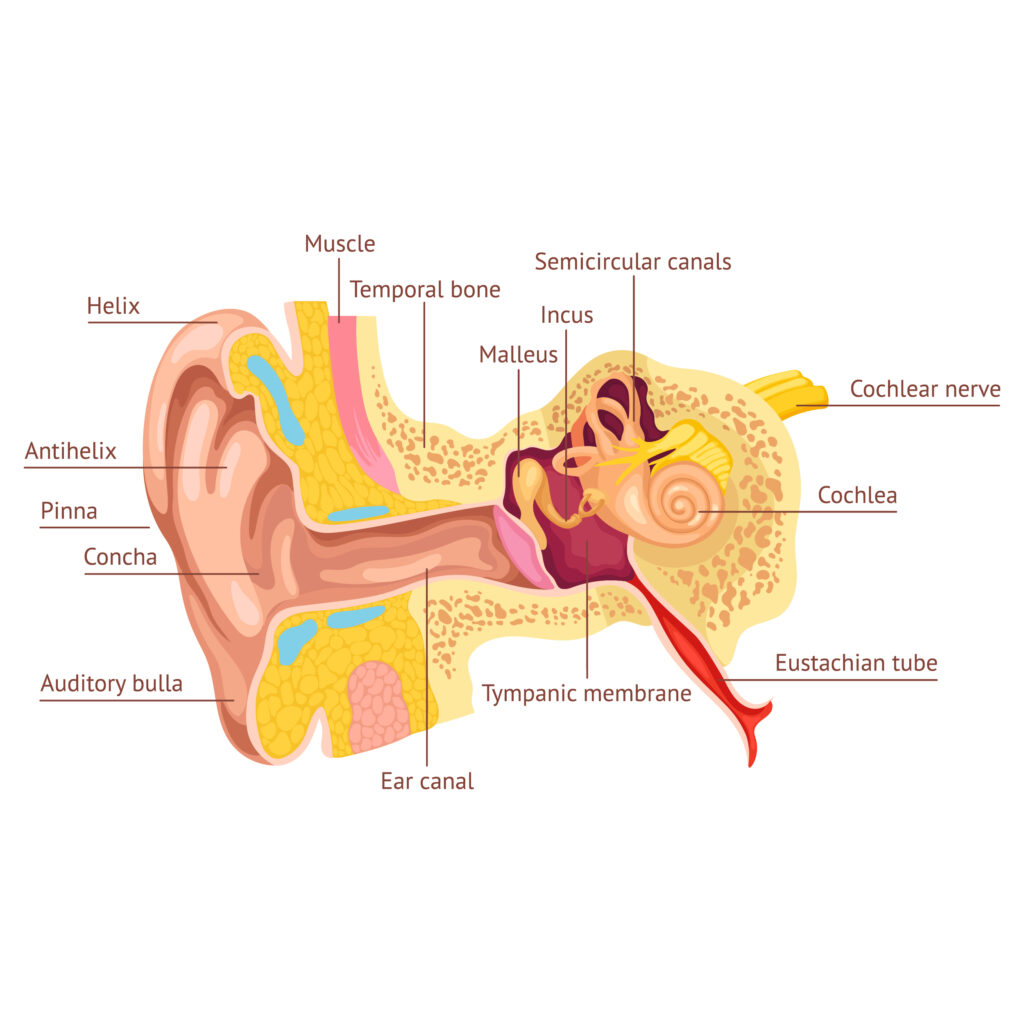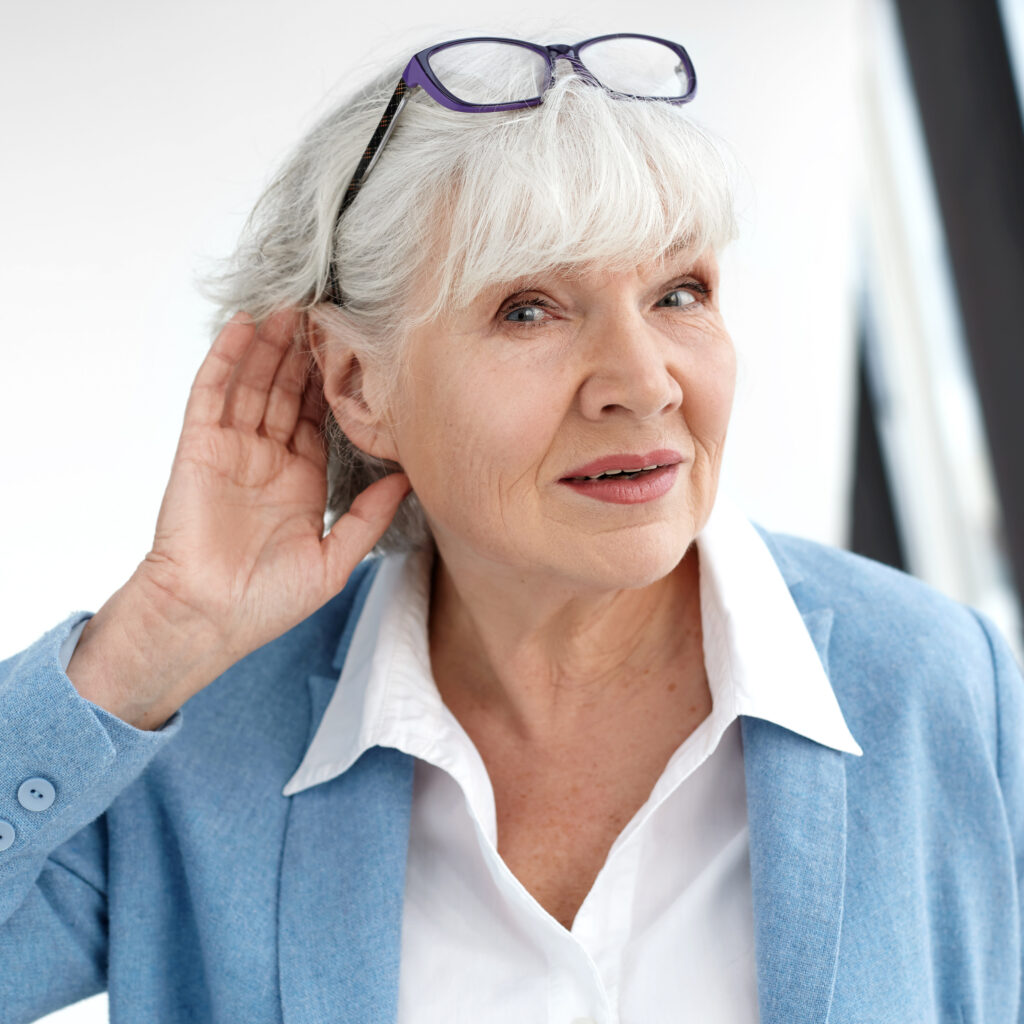This article was written by Suzanne O’Connor, Au.D., a HearingLoss.com®-Certified provider located at Professional Hearing Services in Indianapolis, Indiana.
Sensorineural hearing loss (SNHL) is the most common type of permanent hearing loss — affecting millions of people across all age groups. It’s often gradual, sometimes barely noticeable at first, but it can have a significant impact on your ability to communicate, connect, and fully engage with the world around you.
While this kind of hearing loss can’t be reversed with medication or surgery in most cases, the good news is that it can be managed effectively, and today’s options are more advanced, comfortable, and life-changing than ever before.
If you or a loved one is experiencing changes in hearing, this guide will help you understand what sensorineural hearing loss is, what causes it, how it affects daily life, and most importantly, how to manage it in a way that protects your long-term health and quality of life.
What Is Sensorineural Hearing Loss? Understanding the Basics

Sensorineural hearing loss occurs when there’s damage to the inner ear (cochlea) or the auditory nerve that connects the ear to the brain. Tiny sensory cells called hair cells inside the cochlea detect sound and help convert it into electrical signals. When those cells or nerve pathways are damaged or deteriorate over time, sound may still reach your ear, but it doesn’t get processed clearly or completely by your brain.
This leads to hallmark symptoms such as:
- Feeling like others are mumbling, even when they’re speaking clearly
- Difficulty understanding speech in background noise
- Turning up the volume on the TV or phone
- Trouble hearing high-pitched sounds like birdsong or children’s voices
- Ringing or buzzing in the ears (tinnitus)
This is different from conductive hearing loss, which involves the outer or middle ear and may be treatable with surgery or medication. SNHL is typically permanent, but that doesn’t mean it’s untreatable.
Top Causes of Sensorineural Hearing Loss You Should Know
Sensorineural hearing loss can develop suddenly or gradually, and it often results from one or more of the following:

1. Age-Related Hearing Loss (Presbycusis)
One of the most common causes, presbycusis, refers to the natural decline in hearing ability as we age, especially the loss of high-frequency sounds.
2. Noise Exposure
Regular exposure to loud environments (e.g., concerts, industrial work, firearms, or prolonged headphone use) can cause noise-induced hearing loss, often affecting both ears.
3. Genetics and Family History
Some forms of SNHL are hereditary. If hearing loss runs in your family, you may be genetically predisposed, even if symptoms don’t appear until adulthood.
4. Certain Medical Conditions and Medications
Autoimmune diseases, diabetes, infections like meningitis or measles, and even specific chemotherapy or antibiotic medications can damage the auditory system.
5. Head Trauma or Sudden Hearing Loss
Traumatic injuries or sudden inner-ear events (such as a viral infection) can cause abrupt sensorineural hearing loss. This may require immediate medical attention.

Think You Might Have Hearing Loss? Take the First Step.
Sensorineural hearing loss often starts subtly – like missing high-pitched sounds or struggling in noisy places. Our free online hearing screener can help you understand what’s going on and whether it’s time to speak with a professional.
How Sensorineural Hearing Loss Is Diagnosed by Audiologists
If you suspect hearing loss, the first step is a comprehensive hearing evaluation by a licensed audiologist. This typically includes:
- A pure-tone hearing test to determine how well you hear different frequencies
- A speech understanding test to measure clarity and comprehension
- A review of your medical history and symptoms
- Possibly additional testing to rule out other causes or determine severity
This evaluation helps confirm not just that hearing loss exists, but what type, how much, and how it affects communication — which is key for creating an effective treatment plan.
Proven Management Strategies for Sensorineural Hearing Loss
Although sensorineural hearing loss is usually permanent, there are proven, evidence-based strategies that help people regain clarity, improve communication, and stay connected. Management depends on the severity, the cause, and your lifestyle needs.
Let’s walk through some of the most effective options.
1. Hearing Aids
Once your hearing evaluation confirms sensorineural hearing loss, hearing aids are often the first and most effective management strategy.
Unlike personal sound amplifiers or over-the-counter devices, prescription hearing aids are programmed specifically to match your hearing profile and amplify only the frequencies you struggle with, not just making all sounds louder.
Today’s hearing aids offer:
- Directional microphones for better focus in noisy places
- Noise reduction algorithms to improve clarity
- Bluetooth® connectivity for streaming calls, music, and TV
- Rechargeable batteries and sleek, comfortable designs
- Smart features that adjust automatically to your environment
Whether you’re trying to follow conversations at work, hear your grandchildren more clearly, or just enjoy music again, hearing aids designed for sensorineural hearing loss can restore confidence and connection.
Want to find the best hearing aids for sensorineural hearing loss? An audiologist can recommend models that fit your lifestyle, budget, and specific hearing needs.
2. Assistive Listening Devices (ALDs)
In addition to hearing aids, many people benefit from tools like:
- TV streamers or remote microphones
- Amplified telephones
- Personal FM or Bluetooth systems
- Captioned phone services
These help in challenging listening situations or environments where hearing aids alone may not be enough.
3. Cochlear Implants (for Severe Cases)
If your hearing loss is profound and hearing aids no longer provide benefit, your audiologist may recommend evaluation for a cochlear implant. These devices bypass damaged inner ear structures and directly stimulate the auditory nerve.
They’re typically used when hearing aids are no longer effective, especially for those with advanced SNHL or poor speech recognition scores.
4. Aural Rehabilitation
Managing hearing loss involves more than devices. Many audiologists offer communication training and listening therapy, which can help your brain adapt to new sounds, improve speechreading (lipreading), and strengthen your communication skills.
This may include:
- Learning how to position yourself for better hearing
- Practicing strategies for noisy environments
- Involving family members to support better communication at home
5. Tinnitus Management
If tinnitus (ringing in the ears) is part of your SNHL, your provider may recommend:
- Sound therapy through hearing aids or sound generators
- Cognitive behavioral therapy (CBT)
- Relaxation and mindfulness techniques
Hearing aids can often help reduce tinnitus perception by restoring sound to the frequencies your brain is missing.

Your Hearing Deserves Certified Care
The right management plan starts with the right provider. HearingLoss.com®-Certified professionals follow the highest clinical and patient care standards to help you find solutions that match your lifestyle and hearing needs. Whether you’re considering hearing aids, cochlear implants, or tinnitus relief, expert guidance makes all the difference.
Why Choosing a Professional Audiologist for SNHL Care Matters

You might see ads for hearing aids you can buy online or at retail stores, but those devices may not be suited for sensorineural hearing loss, especially if it’s moderate to severe.
Working with a licensed audiologist gives you access to:
- Customized programming based on your hearing test
- Expert fitting and adjustments for comfort and clarity
- Follow-up care and support as your hearing needs evolve
- Education on realistic expectations and communication strategies
Hearing aids that are poorly fitted or not matched to your hearing loss type often end up unused, which can delay progress and lead to frustration.
How to Protect Your Hearing and Prevent Further Loss
While SNHL is permanent, there are steps you can take to protect your remaining hearing and prevent future damage:
- Use ear protection in noisy environments (concerts, machinery, power tools)
Even short exposure to loud sounds can cause further damage. Keep high-fidelity earplugs handy, especially when attending events or working in loud settings. - Turn the volume down on headphones and earbuds
Follow the 60/60 rule: Listen at no more than 60% volume for no more than 60 minutes at a time. Noise-canceling headphones can help you hear clearly at lower volumes. - Avoid cotton swabs in your ears — they can push wax deeper or damage the canal
Instead, clean your ears with a damp cloth or talk to your audiologist about safe wax removal options. - Manage chronic conditions like diabetes or hypertension
These conditions can affect blood flow to the inner ear. Controlling them through diet, exercise, and medication can help preserve your hearing. - Wear your hearing devices consistently to keep your brain engaged
Your brain relies on sound input to stay sharp. Regular use of hearing aids helps maintain auditory processing and prevents further cognitive decline. - Schedule regular hearing checkups
Routine monitoring ensures early detection of any changes. Your audiologist can adjust your devices and care plan to fit your evolving needs.
Next Steps for Living With Sensorineural Hearing Loss
As an audiologist, I’ve seen firsthand how sensorineural hearing loss can affect not only hearing but also confidence, relationships, and overall quality of life. That’s why I care so deeply about helping my patients take the next step, no matter where they are in their hearing journey.
Whether it’s a subtle change in understanding conversation or a more noticeable decline in sound clarity, getting answers and support can make all the difference. I believe no one should feel isolated or left behind due to hearing loss, and with the right care, you don’t have to.
I’m proud to be part of the HearingLoss.com network because it aligns with my commitment to evidence-based, patient-centered audiology. Every provider in this network, including myself and my team at Professional Hearing Services, follows clinical best practices like real-ear measurement, thorough diagnostic testing using a HIT Box, and personalized treatment plans designed for long-term success.
HearingLoss.com is more than just a website — it’s a trusted resource filled with helpful articles, a provider directory, and tools that empower you to take control of your hearing health.
If you’re ready to reconnect with the world around you, start by talking to a certified professional who puts your well-being first. I’d be honored to support you in that process and so would the wider HearingLoss.com community.
The Bluetooth word mark and logos are registered trademarks owned by Bluetooth SIG, Inc.
For over 40 years, Professional Hearing Services has been known for our clinical expertise and personal approach; we are the area’s most established audiology private practice. Owned and operated by a Doctor of Audiology, we offer premier service guided by best practices, which means we only use the latest technology. We provide comfortable surroundings, courteous service, and thorough follow-up care with a lasting commitment to your satisfaction. Our patients can expect premium care and improved quality of life. Schedule an appointment at our practice in Indianapolis, Indiana, or search for a certified hearing care professional in your area and browse through additional resources, including a free online hearing screener.
References
- Age-related hearing loss. (2021). Mount Sinai Health System. https://www.mountsinai.org/health-library/diseases-conditions/age-related-hearing-loss. (Accessed May 27, 2025).
- Sensorineural deafness Information | Mount Sinai – New York. (2021). Mount Sinai Health System. https://www.mountsinai.org/health-library/symptoms/sensorineural-deafness. (Accessed May 28, 2025).
- Sensorineural Hearing Loss. (2025). Asha.org. https://www.asha.org/public/hearing/sensorineural-hearing-loss/?srsltid=AfmBOoq5seAX4jubsItJrdvoXhxx2W9enS0jwRvdkwjq_OmfYEURpx6T. (Accessed May 27, 2025).
- Tanna, R. J., Lin, J. W., & Jesus, O. D. (2023, August 23). Sensorineural Hearing Loss. Nih.gov; StatPearls Publishing. https://www.ncbi.nlm.nih.gov/books/NBK565860/. (Accessed May 25, 2025).
Book a Professional Hearing Evaluation
An online hearing screener is an important step, but it can’t replace a comprehensive hearing exam by a HearingLoss.com professional. Our goal is to deliver expert hearing loss solutions that improve your life.
Don’t wait! Find your local provider and request an appointment today.
